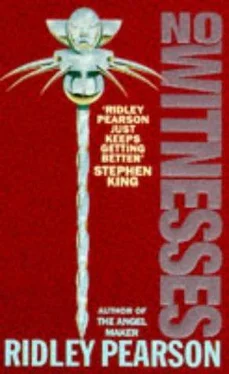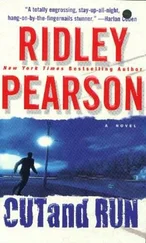Ridley Pearson - No Witnesses
Здесь есть возможность читать онлайн «Ridley Pearson - No Witnesses» весь текст электронной книги совершенно бесплатно (целиком полную версию без сокращений). В некоторых случаях можно слушать аудио, скачать через торрент в формате fb2 и присутствует краткое содержание. Жанр: Триллер, на английском языке. Описание произведения, (предисловие) а так же отзывы посетителей доступны на портале библиотеки ЛибКат.
- Название:No Witnesses
- Автор:
- Жанр:
- Год:неизвестен
- ISBN:нет данных
- Рейтинг книги:4 / 5. Голосов: 1
-
Избранное:Добавить в избранное
- Отзывы:
-
Ваша оценка:
- 80
- 1
- 2
- 3
- 4
- 5
No Witnesses: краткое содержание, описание и аннотация
Предлагаем к чтению аннотацию, описание, краткое содержание или предисловие (зависит от того, что написал сам автор книги «No Witnesses»). Если вы не нашли необходимую информацию о книге — напишите в комментариях, мы постараемся отыскать её.
No Witnesses — читать онлайн бесплатно полную книгу (весь текст) целиком
Ниже представлен текст книги, разбитый по страницам. Система сохранения места последней прочитанной страницы, позволяет с удобством читать онлайн бесплатно книгу «No Witnesses», без необходимости каждый раз заново искать на чём Вы остановились. Поставьте закладку, и сможете в любой момент перейти на страницу, на которой закончили чтение.
Интервал:
Закладка:
“And that means the production line, the loading dock, or the printers,” Fowler offered.
“Storage?” Boldt asked.
Taplin answered, “We’re a just-in-time operation. Printing inventory is kept to a ten-day lead time.”
Making a note, Fowler said, “It should be added to the list.”
Adler addressed Boldt, “If it’s all right with you, Sergeant, I think Kenny should handle all the in-house aspects of this investigation. We operate on a family concept. Police would be noticed, and would be talked about immediately-”
“And given his threats, we certainly don’t want that,” Daphne agreed.
Fowler said, “We’ve had some employee-related thefts lately. I can use that as an excuse for asking around.”
They all agreed on this: The police would remain involved, but well in the background.
“If we’re to meet again,” Adler suggested, addressing Boldt and Daphne, “I suggest we arrange it by fax and not telephone, and that we stay with remote locations.”
“How soon can you make the glue change?”
“Overnight. A day at the outside,” Taplin said, his mood improved.
“Is there anything else that might help us?” Boldt asked. Adler glanced over at Taplin, who glared back at him.
Adler said to Daphne, “Perhaps you could show the sergeant the rest of the yacht. A few minutes is all.”
There was an awkward moment of hesitation, after which the two stood.
She led Boldt forward through a deck dining room to a trio of private quarters and Adler’s floating study, equipped with both cellular phone and fax machine.
“What’s going on in there?” he asked.
“Owen can smooth over any flap. Give him a few minutes.”
“Tell me about Taplin.”
“Bright, protective, loyal. Longtime friend of Owen. Runs a lot of the day-to-day. Owen credits him with much of their success, but that says as much about Owen as it does about Howard Taplin. It’s Owen’s baby; always has been.”
He noticed a caller-ID box connected into the fax machine line. The device would display the phone number of any incoming fax. “Fowler,” Boldt said, pointing it out.
“It’s a good idea, isn’t it?”
“If he shares the results with us,” Boldt said, adding, “which I somehow doubt. Taplin would clearly rather handle this without us. And as you said: Taplin is the one writing Kenny’s paychecks.”
“Owen will give you anything you want, Lou.”
“Is that the inside track?”
She did not like his comment.
“Time,” she declared. She guided him back to the meeting, where the others were waiting. Boldt and Daphne sat down.
Adler said, “We had a scare in the mideighties. Not cholera-salmonella. But it was our soup line.”
“A scare? ” Boldt asked.
“Not an intentional contamination-nothing like that. Some bad poultry in our soup. But four people were hospitalized and there were lawsuits.”
Taplin added, “Let me clarify. We were not held liable. It was not us, but one of our suppliers. It was a state health department matter. I see no reason to make any comparison.”
Boldt said, “We’ll want any files you’ve got on this.”
Adler said, “Of course.” But Taplin stiffened. He opened his mouth to object and Adler interrupted him, saying to Boldt, “ Whatever you need.”
EIGHT
Dressed in a dull green surgical smock and wearing a white paper mask over his mouth and nose, Boldt took up a vigil at Slater Lowry’s hospital bedside, his presence approved by both the medical staff and the boy’s mother, whose mask was damp with tears below the eyes.
The boy’s father had collapsed an hour earlier when Slater’s condition had been downgraded from serious to critical, and was presently under sedation in a room down the hall. The woman’s green surgical smock was wrinkled from where her husband had clutched it for hours.
Slater Lowry was dying of organ failure.
It seemed impossible to Boldt that with the boy having been admitted to the hospital, with his having been diagnosed and treated, that his condition could degenerate so quickly. Gunshot wounds, knife wounds, strangulations, and burns-Boldt had learned to live with all of these over his twenty-plus years of police service. But he did not accept what was happening to this boy.
He felt hypnotized by the steady drip of the IV, by the peaks and valleys of the green lines crawling across the monitors. Slater’s skin was a pasty white, and a light sheen of perspiration made it glisten. His mother dabbed him dry, but it did not last long. Slater Lowry was burning up with fever despite the fluids and antibiotics. Slater Lowry was leaving.
“If we could only trade places,” the woman had mumbled to Boldt an hour earlier. He knew that she meant her son and her, though Boldt thought she might have wished that he could switch places with her-that this would be his son, Miles, lying there, and she the visitor. Since that comment not a word had passed between them. The glances they shared needed no explanations. She blamed Boldt for this, without meaning to. And without meaning to, Lou Boldt accepted it.
As the hours passed, as Friday slipped into Saturday, as the doctors and nurses came and went, Boldt imagined this boy a young man, the young man an adult. He envisioned the successes and failures, the joys and heartbreaks that compromised his own life, and he loaned these to Slater Lowry believing that a borrowed dream was better than none at all.
At two in the morning the father returned to the room, dulled and incoherent in his few attempts to share. Boldt rose to leave them, but the woman said, “Stay if you want,” and Boldt sat back down. He was not certain what drew him to this boy or this woman or this room, and he knew firsthand the trials of taking a personal interest in the victims-a detective needed a certain degree of distance-but he kept his seat and stayed. For some reason he found it impossible to leave.
At two-forty, several of the electronic monitors sounded alarms at once, and Boldt’s pulse quickened as Slater Lowry’s faded. A team of nurses and physicians swarmed the boy’s bedside. Their work silence the alarms, and twenty minutes later, with the boy stabilized, the doctor held a private conference with the parents. After that, Boldt remained outside the room, viewing the boy through the glass window that communicated with the nurses’ station, where the monitor signals were repeated on small television screens tucked beneath the counter. Inside the room there was only enough space for three chairs, and Boldt’s was now occupied by a woman minister who prayed quietly, her chair pulled close alongside the bed, the boy’s limp hand clutched between her own, her lips moving in silent prayer. Boldt realized there were to be no more beaches for Slater Lowry, no more late-summer nights, no more smiles or complaints or singing or trading football cards-no more birthdays.
The nurses offered Boldt a seat and offered him coffee. When a third woman reminded him the cafeteria was open twenty-four hours, he turned and snapped, “It’s him that needs you, not me!” And there was no time to apologize to her, for the monitor alarms called out for a second time, ringing in Boldt’s ears like church bells.
The moment of death, recorded as 3:11 A.M. Saturday, June 30, played out before Boldt in an eerie and hollow silence. The monitors cried out the truth, though Boldt clung to hope. He encouraged the boy to recovery, a spectator rooting from the sidelines. The nurses and doctors once again rushed to revive the boy, but for all their efforts, all the technology, there were no miracles left.
The parents hugged tightly in terror; the minister stepped out of the way and closed her eyes.
Читать дальшеИнтервал:
Закладка:
Похожие книги на «No Witnesses»
Представляем Вашему вниманию похожие книги на «No Witnesses» списком для выбора. Мы отобрали схожую по названию и смыслу литературу в надежде предоставить читателям больше вариантов отыскать новые, интересные, ещё непрочитанные произведения.
Обсуждение, отзывы о книге «No Witnesses» и просто собственные мнения читателей. Оставьте ваши комментарии, напишите, что Вы думаете о произведении, его смысле или главных героях. Укажите что конкретно понравилось, а что нет, и почему Вы так считаете.












